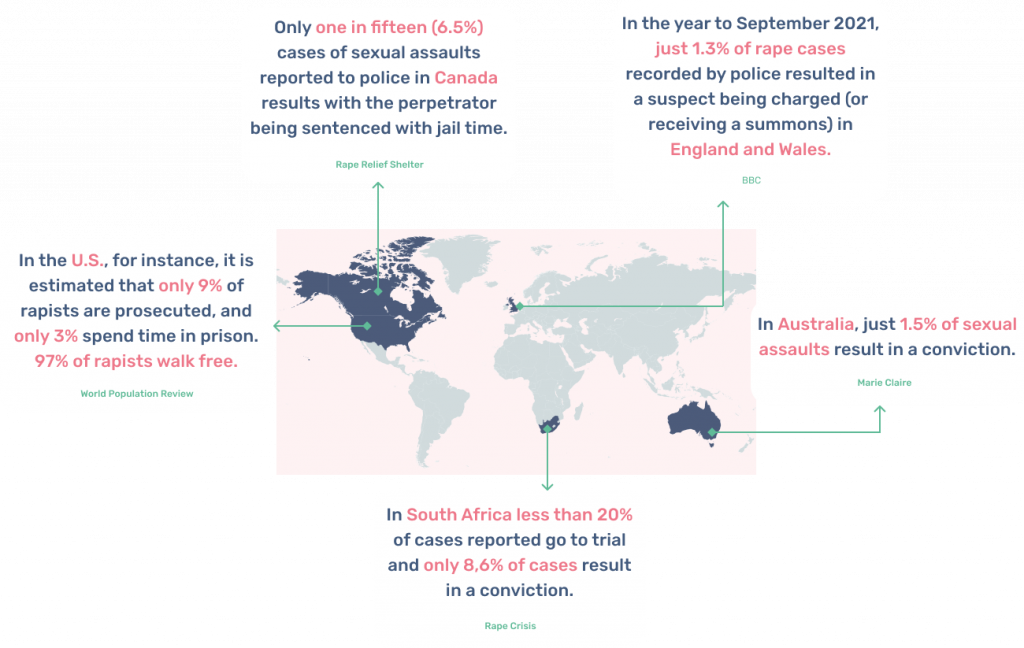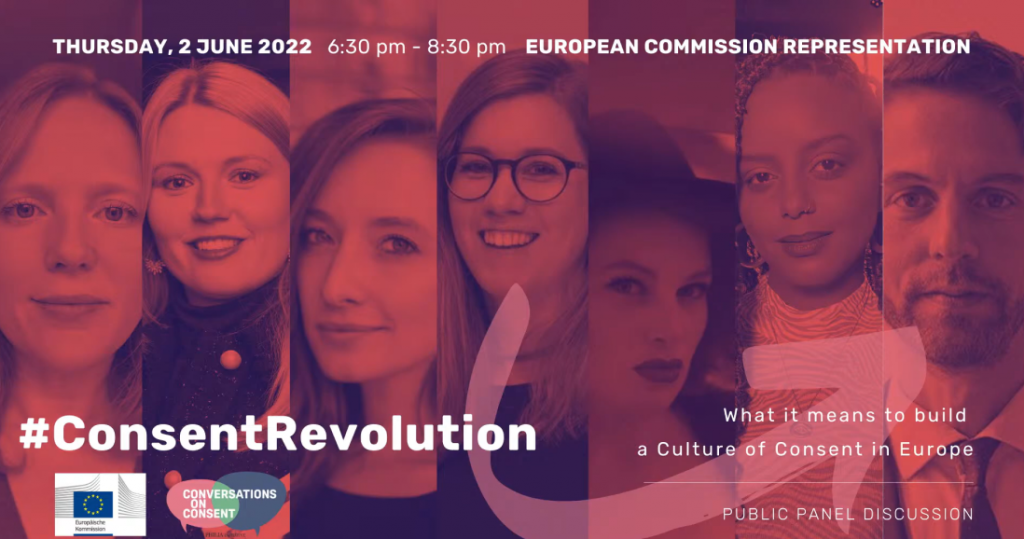Let’s make consent mandatory
Strides towards criminalising non-consensual sexual activity and making consent mandatory in law have been made all around the world

There have been advances on defining consent all around the world, whether in the GDPR (General Data Protection Regulation) in the EU, the New York Bill in the US, the new Criminal Code of the Republic of Malta or the recent developments in Spain.
We want to add to these advances and advocate for a harmonised global approach, in line with the Istanbul Convention focusing on Article 36, and with the European Commission’s proposed Directive, to criminalise rape based on the lack of consent.
Presenting
CONVERSATIONS ON CONSENT
at the European Commission Representation
The legal definition of consent was presented at the European Commission Representation in Berlin, supporting their proposed directive to criminalise rape based on the lack of consent. The discussion revolved around the creation of a consent culture based on the importance of sexual and social consent in Europe.
Meet The Consent Council
Together with distinguished experts from all around the world, we are working on creating legal advancements on defining consent.

Désirée Attard
Human Rights Lawyer

Avani Bansal
Advocate, Supreme Court of India

Müge Demirkır
Human Rights Lawyer

Katja Dunkel
Dunkel Richter

Kate Ellis
Centre for Women’s Justice

Thordis Elva
NORDREF

Jonathan Herring
Oxford University

Sinem Hun
Genderscope

Aslı Karataş
Sebuka

Alena Klatte
Anna Nackt

Stamatina Liosi
Southampton Law School

Mina Morova
Vinson & Elkins LLP

Charlotte Proudman
Goldsmith Chambers

Rebecca Richter
DUNKEL RICHTER

Emily Setty
University of Surrey

Gülriz Uygur
Ankara University

Sara de Vido
Ca' Foscari University of Venice
Defining Consent
We propose that sexual offences legislation should include the following definition of consent:
To ensure bodily and sexual autonomy, integrity, and wellbeing consent must be obtained through honest, respectful, genuine, and open communication. The defendant has a responsibility to ensure there is consent. Consent must be obtained for each sexual act between the parties and can be withdrawn at any time. It must also be obtained for sexual activity in the digital realm to ensure the right to privacy, confidentiality, and non-defamation. It must be informed, voluntary, free without monetary compensation, retractable and unequivocal. Consent can only be given when one has capacity.
It will be assumed that consent can neither be obtained nor given in the context of power imbalance in terms of access to networks, resources and/or knowledge, unless the defendant proves otherwise. Such contexts include any form of inequality between the parties, including, but not limited to, inequality of access or liberties to any means, resulting or potentially resulting in any legal, economic, social, or other vulnerabilities.
The defendant can never obtain consent through threats, force or other forms of coercion, abduction, fraud, deception, abuse of power or a position of vulnerability or dependency. Consent cannot be obtained through insistence, manipulation, emotional threats, blackmail, or making the victim feel guilty for an action and presenting sexual behaviour as a way of compensation. Within this context, coercion is defined as intimidation, compulsion, domination, or control. Deception or false pretence may include – but is not limited to – evoking, taking advantage of, and failing to correct the victim’s misunderstanding about the defendant’s identity or situation, or the nature of the act.
It will be assumed that consent cannot be given tacitly through non-communication or inactivity. It cannot be given by someone who is unable to exercise free will, including a condition which prevents the giving of consent such as being in a state of unconsciousness, intoxication, sleep, illness, bodily injury, or under duress or distress. Everyone has the right to exercise their free will, bodily and mental integrity, autonomy, and self-determination, irrespective of sexual orientation, gender identity, gender expression or sex characteristics.
Legal Benefits
Here are reasons why we need this type of definition of consent:
Many laws have already moved beyond the myth that sexual violence always requires the use of force or the breaking of resistance to be identified as rape. They now range from ‘no means no’ (Germany) to ‘yes means yes’ (Sweden) approaches.
Additionally, the victim’s agreement does not always equal consent.
Consent does not only refer to a person’s verbal agreement. One’s agreement does not always equate consent. Interpersonal relationship dynamics that are often marked by a distinct power imbalance, as well as the specific context in which the sexual assault took place, must also be considered.
Anyone who wants to engage another person in sexual touch has the responsibility to ensure that they have their full and informed consent to be touched. Relying on assumptions, guesses, hopes, past consent, rape myths, or prejudices is not consistent with the principle of full and informed consent. Sexual touch is only justified if a person gives consent.
Consent can only validly be provided by a person who has the capacity to give it, bearing in mind that capacity is time, place and situation-specific. Consent to engage in sexual activity at a given point in time does not equal consent at a later time. A person may lack capacity if they are unable to make an informed decision for themselves, whether as a result of intoxication, fear, mistake, or mental impairment. A person may be conscious but still lack capacity.
A prosecutor should not be required to prove the complainant’s lack of consent. Rather, it is the defendant who should prove that the sexual touch was legitimate.
For example, instead of asking: “was the complainant so afraid that their consent was not valid?”, we should ask “was the defendant justified in touching the complainant, given that their knowledge that the complainant was afraid”. As a frightened person’s consent cannot be taken as a clear indicator of full and informed consent, the defendant’s actions cannot be justified based on that consent.
The key question in criminal proceedings should be whether the defendant has shown respect for the complainant’s sexual autonomy by giving them the time, space, freedom from coercion, and information they needed to make their decision.
The law should find that an offence was committed by the lack of respect for the complainant’s sexual autonomy if the defendant failed to: ask the complainant whether they consented, misled them, or failed to disclose information required for the complainant to make an informed decision, or pressured them. A defendant who knew the complainant was intoxicated at the time cannot rely on that complainant’s consent as a defense.
No more Impunity
This infographic shows why we need a comprehensive and global legal definition of consent to facilitate prosecutions of rape and sexual assault.

Social and cultural norms and attitudes have fueled an environment that accepts and normalizes sexual violence, and creates a sense (real or perceived) of impunity for the perpetrators. This is rape culture.
We need a concerted and harmonised global approach
Why should anyone’s safety be compromised because of their nationality or location?
A global standard definition of consent in accordance with the proposed text can ensure people’s rights to safety everywhere. If everyone is aware of their fundamental right to experience consensual behaviour, they can demand justice.
Act Now
All laws without exception should make it clear that non-consensual sexual acts are a human rights violation.
We are evolving as we share
Let us know about your comments and feedback on the information provided on our website. Is there anything to be added or adjusted? Simply contact us.

Stay up to date with the latest podcasts, new resources, and progress with our petition.








